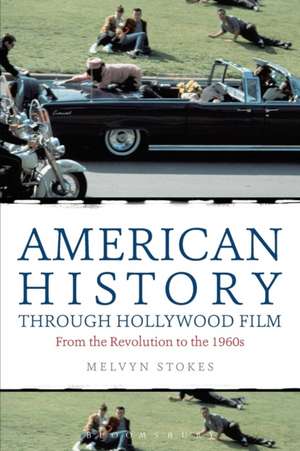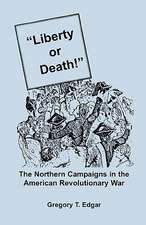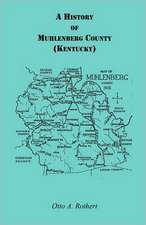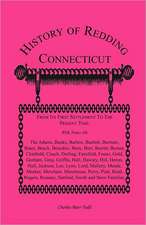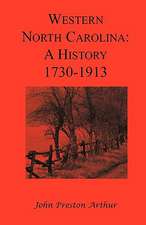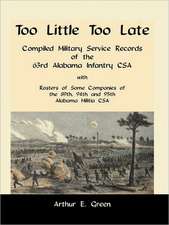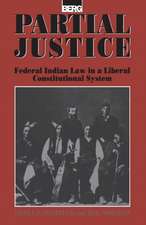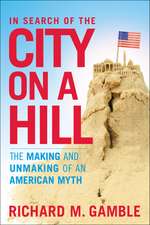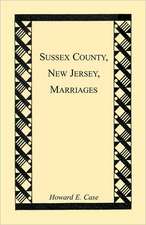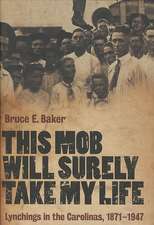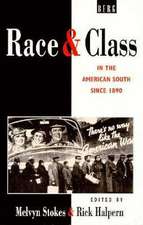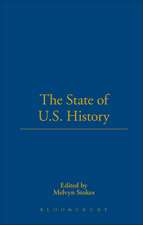American History through Hollywood Film: From the Revolution to the 1960s
Autor Melvyn Stokesen Limba Engleză Paperback – 4 dec 2013
| Toate formatele și edițiile | Preț | Express |
|---|---|---|
| Paperback (1) | 219.84 lei 43-57 zile | |
| Bloomsbury Publishing – 4 dec 2013 | 219.84 lei 43-57 zile | |
| Hardback (1) | 775.02 lei 43-57 zile | |
| Bloomsbury Publishing – 4 dec 2013 | 775.02 lei 43-57 zile |
Preț: 219.84 lei
Preț vechi: 245.89 lei
-11% Nou
Puncte Express: 330
Preț estimativ în valută:
42.07€ • 44.03$ • 35.01£
42.07€ • 44.03$ • 35.01£
Carte tipărită la comandă
Livrare economică 31 martie-14 aprilie
Preluare comenzi: 021 569.72.76
Specificații
ISBN-13: 9781441175922
ISBN-10: 144117592X
Pagini: 312
Dimensiuni: 156 x 234 x 18 mm
Greutate: 0.45 kg
Editura: Bloomsbury Publishing
Colecția Bloomsbury Academic
Locul publicării:London, United Kingdom
ISBN-10: 144117592X
Pagini: 312
Dimensiuni: 156 x 234 x 18 mm
Greutate: 0.45 kg
Editura: Bloomsbury Publishing
Colecția Bloomsbury Academic
Locul publicării:London, United Kingdom
Caracteristici
A coherent analysis of the key historical themes and issues represented in Hollywood feature films
Notă biografică
Melvyn Stokes is Reader in Film History in the Department of History at University College London, UK.
Cuprins
Introduction 1. The American Revolution 2. Slavery 3. Abraham Lincoln 4. The Civil War 5. The War's Legacy: the Lost Cause and the Ku Klux Klan 6. 'The Good Indian': Dances With Wolves 7. The Golden Door: Hester Street and The Godfather Part II 8. The Limits of Hollywood History: The Grapes of Wrath and the Great Depression 9. HUAC and Hollywood: The Way We Were and Guilty by Suspicion 10. Remembering the 1960s: Mississippi Burning and JFK BibliographyIndex
Recenzii
American History through Hollywood Film is a very useful book. The range of topics and films covered, Stokes's knowledge, rigorous methodology, precise style and experience teaching this topic, make it an indispensable book for a class on American history in Hollywood cinema and a book that should be recommended as an example to all students writing theses or dissertations on the representation of history on film or the relationship between history and cinema. The overviews it offers on each point will provide a good starting point for any student or scholar interested in pursuing them. For all of these reasons, I cannot recommend Stokes's book enough.
By drawing on an extensive and well documented range of sources himself, Melvyn Stokes has provided a "one stop shop" for History teachers. Although his focus his America, his pedagogy is easily transferable. This is a book worth including on all faculty bookshelves.
A major strength of the book is that it does not try to do too much, providing a highly readable and succinct account of particular pressure points in the American experiment ... Sophisticated in its analysis, this book is well worth reading for any scholar of the subject and a valuable resource to anyone looking for a useful way into a subject that preoccupies academics, critics and audiences alike.
Stokes offers a roughly chronological examination of two hundred years of American history, as portrayed in films produced between 1915 (The Birth of a Nation) and 2012 (Django Unchained). . The individual chapters can stand alone, and an introduction by the author offers a persuasive overview of film analysis as historical endeavor. Stokes's American History through Hollywood Film is appropriate for undergraduates and will encourage them to think critically about the history they learn at the cinema.
In American History Through Hollywood Film, Melvyn Stokes offers an impressive overview of filmmakers and audiences' fascination with pivotal periods in the nation's past. With his intelligent analysis and well balanced synthesis of a range of films and historical issues, Stokes has made a significant contribution to the historiography of film and history. The book will be an invaluable resource for students and teachers in a rapidly growing field.
American History through Hollywood Film is the most readable and wide-ranging book ever published about how movies write US history, and how they reflect the preoccupations of their own time. From the American Revolution to the present, Professor Stokes is nimble and wise in his choice of subjects and themes, his gifts as a storyteller and historian coming together to explain why some films are successful at the box office, endure in the public imagination, or disappear from popular memory. He is never less than fascinating when he analyzes the often strange alchemy between fact and fiction that occurs when historical films are made, paying close attention to the constraints on their production, the imperatives driving their ideology, and the vicissitudes of their reception.
American History Through Hollywood Film offers an impressively detailed overview of a lively field of study. Its ten chapters consider the historical periods, events and figures that have captivated filmmakers and audiences from the silent period to recent blockbusters. Each chapter provides a clear and concise commentary on issues of historiography, historical accuracy and interpretation, as well as case studies considering how, when and why key films were made. With topics ranging from the American Revolution to the civil rights movement, and case studies stretching from The Birth of a Nation to Django Unchained, this is an authoritative and very useful account of Hollywood's treatment of American history.
With a sharp eye for cinematic detail coupled with historical acuity and old-fashioned research, Melvyn Stokes captures a behind the lens look at some watershed Hollywood pictures that define or-in some cases-interpret significant national events. From the 1776 Revolution to the 1963 Kennedy Assassination, American History Through Hollywood Film explains the symbiotic relationship between a country's past and its cinematic interpretation that-once projected on the screen-frequently spins off into fiction, fantasy or, occasionally, falsehood. For historians, sociologists, and movie buffs, this well-crafted book sheds new light on film's persuasive nature to influence and educate.
By drawing on an extensive and well documented range of sources himself, Melvyn Stokes has provided a "one stop shop" for History teachers. Although his focus his America, his pedagogy is easily transferable. This is a book worth including on all faculty bookshelves.
A major strength of the book is that it does not try to do too much, providing a highly readable and succinct account of particular pressure points in the American experiment ... Sophisticated in its analysis, this book is well worth reading for any scholar of the subject and a valuable resource to anyone looking for a useful way into a subject that preoccupies academics, critics and audiences alike.
Stokes offers a roughly chronological examination of two hundred years of American history, as portrayed in films produced between 1915 (The Birth of a Nation) and 2012 (Django Unchained). . The individual chapters can stand alone, and an introduction by the author offers a persuasive overview of film analysis as historical endeavor. Stokes's American History through Hollywood Film is appropriate for undergraduates and will encourage them to think critically about the history they learn at the cinema.
In American History Through Hollywood Film, Melvyn Stokes offers an impressive overview of filmmakers and audiences' fascination with pivotal periods in the nation's past. With his intelligent analysis and well balanced synthesis of a range of films and historical issues, Stokes has made a significant contribution to the historiography of film and history. The book will be an invaluable resource for students and teachers in a rapidly growing field.
American History through Hollywood Film is the most readable and wide-ranging book ever published about how movies write US history, and how they reflect the preoccupations of their own time. From the American Revolution to the present, Professor Stokes is nimble and wise in his choice of subjects and themes, his gifts as a storyteller and historian coming together to explain why some films are successful at the box office, endure in the public imagination, or disappear from popular memory. He is never less than fascinating when he analyzes the often strange alchemy between fact and fiction that occurs when historical films are made, paying close attention to the constraints on their production, the imperatives driving their ideology, and the vicissitudes of their reception.
American History Through Hollywood Film offers an impressively detailed overview of a lively field of study. Its ten chapters consider the historical periods, events and figures that have captivated filmmakers and audiences from the silent period to recent blockbusters. Each chapter provides a clear and concise commentary on issues of historiography, historical accuracy and interpretation, as well as case studies considering how, when and why key films were made. With topics ranging from the American Revolution to the civil rights movement, and case studies stretching from The Birth of a Nation to Django Unchained, this is an authoritative and very useful account of Hollywood's treatment of American history.
With a sharp eye for cinematic detail coupled with historical acuity and old-fashioned research, Melvyn Stokes captures a behind the lens look at some watershed Hollywood pictures that define or-in some cases-interpret significant national events. From the 1776 Revolution to the 1963 Kennedy Assassination, American History Through Hollywood Film explains the symbiotic relationship between a country's past and its cinematic interpretation that-once projected on the screen-frequently spins off into fiction, fantasy or, occasionally, falsehood. For historians, sociologists, and movie buffs, this well-crafted book sheds new light on film's persuasive nature to influence and educate.
